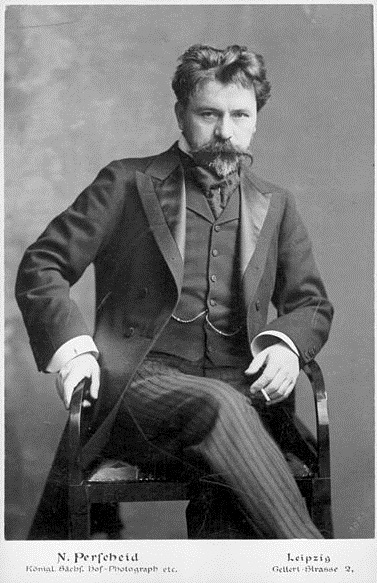<Back to Index>
- Mathematician Albert Nikolayevich Shiryaev, 1934
- Conductor Arthur Nikisch, 1855
- Chancellor of Austria Karl Buresch, 1878
PAGE SPONSOR

Arthur Nikisch (Hungarian: Nikisch Artúr; 12 October 1855 – 23 January 1922) was a Hungarian conductor who performed internationally, holding posts in Boston, London and - most importantly - Berlin. He was considered an outstanding interpreter of the music of Bruckner, Tchaikovsky, Beethoven and Liszt. Johannes Brahms praised Nikisch's performance of his Fourth Symphony as "quite exemplary, it's impossible to hear it any better."
Arthur Augustinus Adalbertus Nikisch was born in Mosonszentmiklós, Hungary to a Hungarian father, and a mother from Moravia.
Nikisch studied under Felix Otto Dessoff, Johann von Herbeck, and Joseph Hellmesberger, Jr., at the Vienna Conservatory, where he won prizes for composition and performance on violin and piano. However, he was to achieve most of his fame as a conductor. In 1878 he moved to Leipzig and became second conductor of the Leipzig Opera in 1878 and in 1882 promoted as principal conductor. He gave the premiere of Anton Bruckner's Symphony No. 7 in 1884.
On 1 July 1885 Nikisch married Amelie Heussner (1862 - 1938), a singer and actress, who had been engaged the preceding years at the Kassel court theatre with Gustav Mahler. Their son Mitja (1899 - 1936) later became a noted pianist.
Nikisch later became conductor of the Boston Symphony Orchestra, and from 1893 to 1895 director of the Royal Opera in Budapest. In 1895 he succeeded Carl Reinecke as director of the Leipzig Gewandhaus Orchestra. In the same year he became principal conductor of the Berlin Philharmonic, and held both positions until his death.
He was a pioneer in several ways. In 1912 he took the London Symphony Orchestra to the United States, a first for a European orchestra. In 1913, he made one of the earliest recordings of a complete symphony, Beethoven's 5th, with the Berlin Philharmonic, a performance later reissued on LP and CD by EMI. He also made a series of early recordings with the London Symphony Orchestra, some of which display the portamento characteristic of early twentieth century playing.
He died in Leipzig in 1922, and was buried there. Immediately after his death, the square where he had lived was renamed Nikischplatz, and in 1971 the city created the Arthur Nikisch Prize for young conductors.
His legacy is as one of the founders of modern conducting, with deep analysis of the score, a simple beat, and a charisma that let him bring out the full sonority of the orchestra and plumb the depths of the music. Nikisch's conducting style was greatly admired by Leopold Stokowski, Arturo Toscanini, Sir Adrian Boult, Fritz Reiner, Ervin Nyíregyházi, and many others. Reiner said, "It was [Nikisch] who told me that I should never wave my arms in conducting, and that I should use my eyes to give cues."